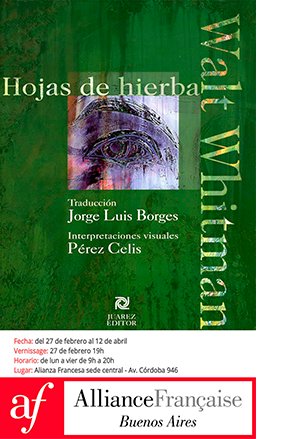ALLEGRA PACHECO AND THE IMPACT OF THE LABOR ISSUE
There seems to be, and increasingly so, a constant and growing debate in the social sphere about labor relations and the impact of work on people. Almost absolute concepts in current narratives such as work-life balance or resilience lack the necessary background to create that conversation. However, in order to build precisely on them, the research being done on the impact and culture of work in this new revision that Postmodernity leads to value proposals such as the one Allegra Pacheco (San Jose, Costa Rica, 1986) lands in her conceptual Dear Salaryman, which in its latest evolution is exhibited at the Museo La Neomudéjar in Madrid.
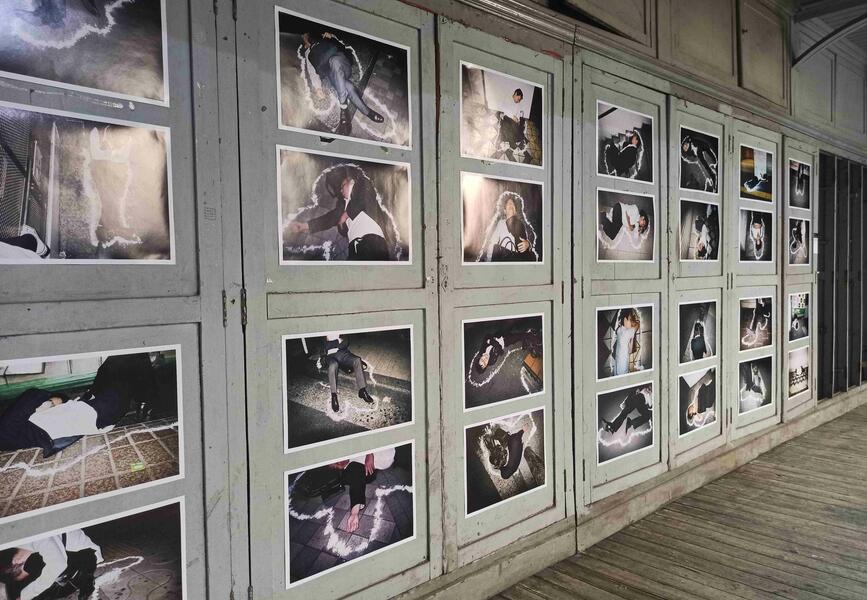
Starting from the experience and personal impact of a cultural shock when she moved to Tokyo, the Costa Rican artist investigates in depth the cultural and social planes of the anthropology of work. If one pays attention to the Japanese imaginary of the exhausted worker, present in many social manifestations and almost integrated in the Western collective memory, one can understand that almost imperious need generated from that impact and that serves as a starting point for this production.
Despite the fact that the exhibition is trapped under the agglutinating concept of work and with clear aesthetic and objectual references to Japanese culture, the proposal of the artist intends to go beyond a specific location, encouraging the viewer to transfer the extreme that she observes with the local reality and thus question the personal reality of a global problem. In this way, Dear Salaryman facilitates through the exhibited works and videos that first step of approach, of delving, precisely, in the person as such and the function that the labor exerts on her and all of them being reference of the Japanese as extreme function.
See, for example, Salaryman Haiku, which develops the concept and the poem, confronted in its supposed beauty narcotized by the billing paper on which it is made in front of death chalk marks and a panel of photographs of everyday scenes that will be repeated as a wrapper in each of the rooms. Sometimes, that binder is of a sonorous character, like the Regain jingle that floods the room from its function in the sculptural installation Regain. Corporate Ladder and that incites without concealment and from an almost pop perspective to that debate, while at other times the references oscillate between the traditional and the usual, between that Sword and briefcase and Kimono to Newspaper, all of them with a side to look after in this research.
The final representation drawn in the viewer's head could be considered the key to this Dear Salaryman, chiseled with that diversity of techniques and conceptual approaches, and which becomes an almost innate response to the question posed. Although Pacheco's work can be seen exclusively from the academic and research point of view, the aesthetic part should not be left in the background, no matter how little or how much it contains of vehicular, because, deep down, it is also essential to trace that answer.
-
Dear Salaryman, de Allegra Pacheco, en La Neomudéjar
-
Dear Salaryman, de Allegra Pacheco, en La Neomudéjar
-
Dear Salaryman, de Allegra Pacheco, en La Neomudéjar
-
Dear Salaryman, de Allegra Pacheco, en La Neomudéjar
-
Dear Salaryman, de Allegra Pacheco, en La Neomudéjar
-
Dear Salaryman, de Allegra Pacheco, en La Neomudéjar
-
Dear Salaryman, de Allegra Pacheco, en La Neomudéjar
-
Dear Salaryman, de Allegra Pacheco, en La Neomudéjar
-
Dear Salaryman, de Allegra Pacheco, en La Neomudéjar
Dear Salaryman can be seen until November 10 at the Museo La Neomudéjar, Antonio Nebrija st., Madrid (Spain).
Related Topics
May interest you
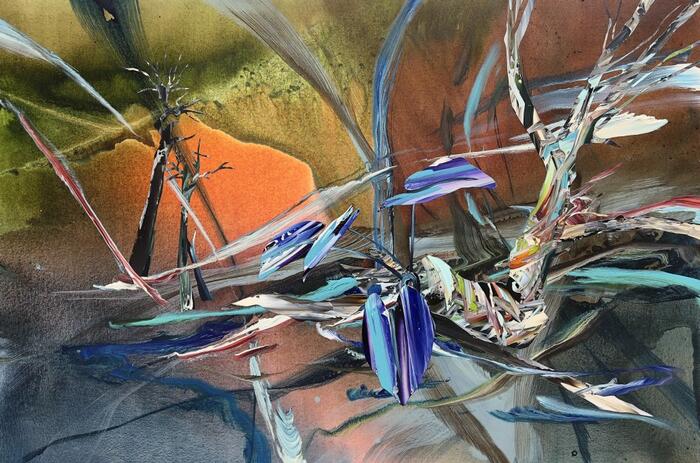
Germán Tagle (Santiago, Chile, 1976) returns to Madrid's Daniel Cuevas, where he held his first exhibition two years ago, with El territorio portátil, a show in which the Chilean artist returns to the axes of landscape, painting and culture that have been the backbone of his latest productions.
GERMÁN TAGLE'S REDEFINITION OF LANDSCAPE
Germán Tagle (Santiago, Chile, 1976) returns to Madrid's Daniel Cuevas, where he held his first exhibition two years ago, with El territorio portátil, a show in which the Chilean artist returns to the axes of landscape, painting and culture that have been the backbone of his latest productions.

Germán Tagle (Santiago, Chile, 1976) returns to Madrid's Daniel Cuevas, where he held his first exhibition two years ago, with El territorio portátil, a show in which the Chilean artist returns to the axes of landscape, painting and culture that have been the backbone of his latest productions.
GERMÁN TAGLE'S REDEFINITION OF LANDSCAPE
Germán Tagle (Santiago, Chile, 1976) returns to Madrid's Daniel Cuevas, where he held his first exhibition two years ago, with El territorio portátil, a show in which the Chilean artist returns to the axes of landscape, painting and culture that have been the backbone of his latest productions.
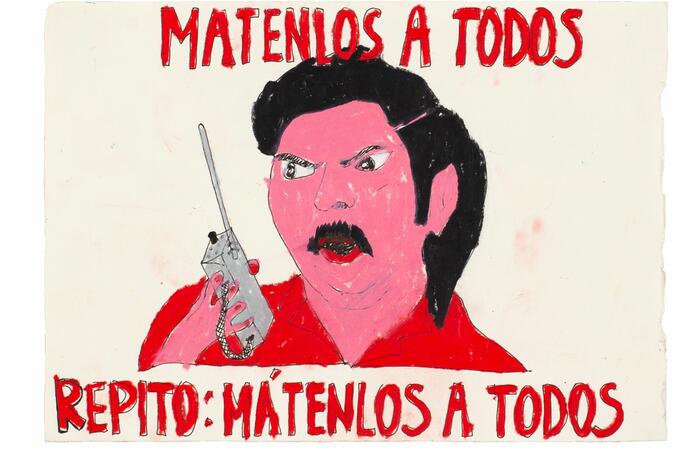
The double problem that arose from the acquisition in the 1980s of several hippopotamuses in one of the many eccentricities of the trafficker Pablo Escóbar is the starting point of a fable that, between the tragic and the comic, Camilo Restrepo (Medellín, Colombia, 1975) has managed to weave with a very successful graphic and conceptual narrative. With Cocaine Hippos Sweat Blood, the spectator faces this surrealistic story from its beginnings to the present by the hand of a figurativism that sets aside the academic and the technical for the sake of a greater aesthetic and relational concordance with that of the madness transmitted by the story itself.
THE NARCO-HYPOPOTAMUSES’ TALE, BY CAMILO RESTREPO
The double problem that arose from the acquisition in the 1980s of several hippopotamuses in one of the many eccentricities of the trafficker Pablo Escóbar is the starting point of a fable that, between the tragic and the comic, Camilo Restrepo (Medellín, Colombia, 1975) has managed to weave with a very successful graphic and conceptual narrative. With Cocaine Hippos Sweat Blood, the spectator faces this surrealistic story from its beginnings to the present by the hand of a figurativism that sets aside the academic and the technical for the sake of a greater aesthetic and relational concordance with that of the madness transmitted by the story itself.
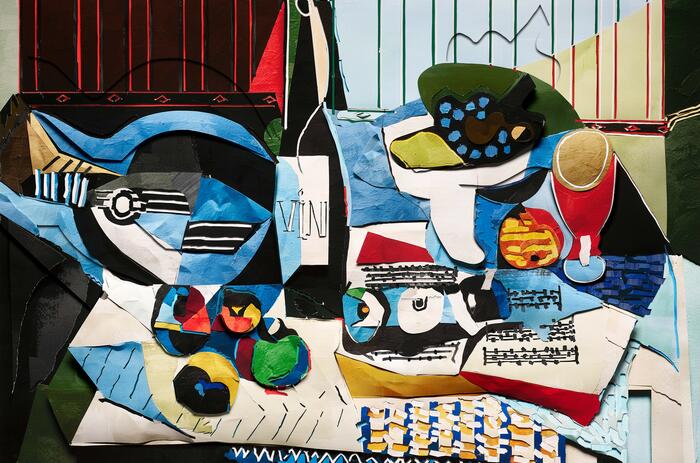
Madrid's Elba Benitez gallery has entrusted Vik Muniz (Sao Paulo, Brazil, 1961) with its first exhibition of the new season. Entitled Photocubism, the proposal is based on art historiography itself, recovering the cubist aesthetics as a substratum of the technical intervention he makes on iconic works of this movement. The Brazilian artist thus opts for this language to obtain new images that raise questions about perception and result.
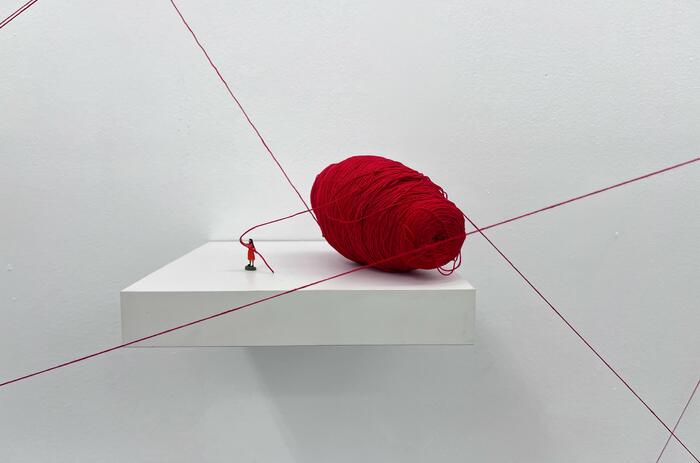
Liliana Porter (Buenos Aires, Argentina, 1941) has a long history shared with Espacio Minimo. The Madrid gallery pampers every move and celebrates the extensive relationship with the Argentinean artist, always offering her the possibility of receiving her work and witnessing its evolution. For the opening of the space's season, the landing is called Otros cuentos inconclusos, a new proposal that deals with representation and two dimensional axes —space and time— that bear witness to many of the questions raised about human relations.
THE UNFINISHED STORIES OF LILIANA PORTER
Liliana Porter (Buenos Aires, Argentina, 1941) has a long history shared with Espacio Minimo. The Madrid gallery pampers every move and celebrates the extensive relationship with the Argentinean artist, always offering her the possibility of receiving her work and witnessing its evolution. For the opening of the space's season, the landing is called Otros cuentos inconclusos, a new proposal that deals with representation and two dimensional axes —space and time— that bear witness to many of the questions raised about human relations.
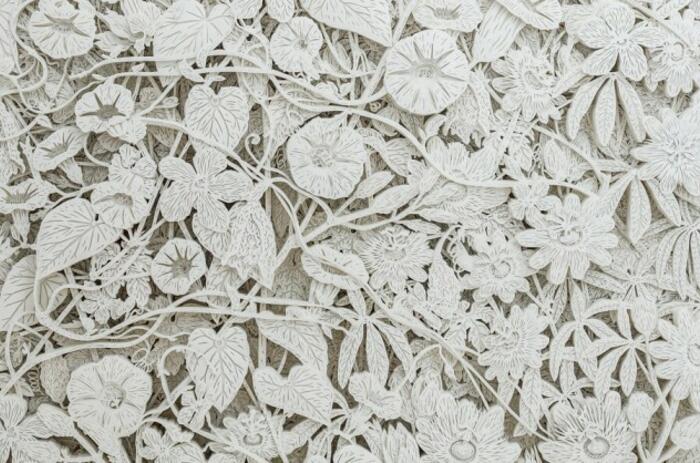
Cuban-born artist Ariamna Contino presents the exhibition Manigua at El Apartamento, in Spain to revisit the concept of “manigua”, a term historically used to refer to a tropical forest ecosystem.
ARIAMNA CONTINO: THE FOREST IS DISORDER, ABUNDANCE AND CONFUSION
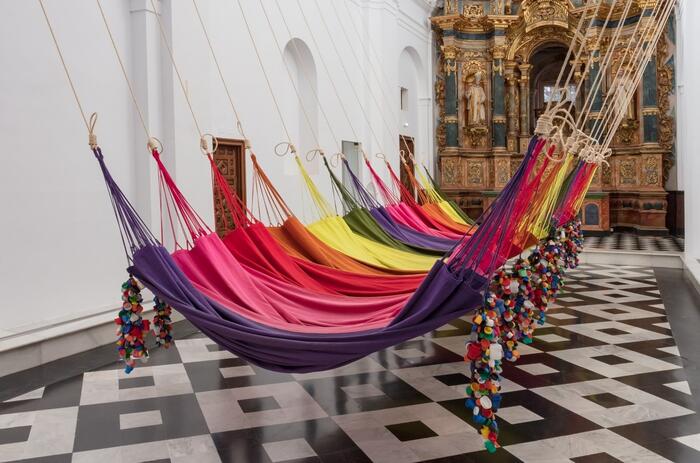
The artistic collective from Rio de Janeiro OPAVIVARÁ! intervenes in the space of the Capilla de Afuera of the Centro Andaluz de Arte Contemporáneo in Seville with its Rede social, a sensorial and materialized symbology with which the Brazilians invite the spectator to place himself in a position to negotiate and cooperate with his fellow men and women. The intervention, consisting of the unfolding of fabric hammocks that acquire the rhythm and cadence that the visitor imprints with his movement and presence and that adds sounds of snoring, follows the group's premise of building spaces and devices that offer a collaborative experience.
OPAVIVARÁ! INSTALLS ITS “SOCIAL NETWORK” IN THE CAAC
The artistic collective from Rio de Janeiro OPAVIVARÁ! intervenes in the space of the Capilla de Afuera of the Centro Andaluz de Arte Contemporáneo in Seville with its Rede social, a sensorial and materialized symbology with which the Brazilians invite the spectator to place himself in a position to negotiate and cooperate with his fellow men and women. The intervention, consisting of the unfolding of fabric hammocks that acquire the rhythm and cadence that the visitor imprints with his movement and presence and that adds sounds of snoring, follows the group's premise of building spaces and devices that offer a collaborative experience.
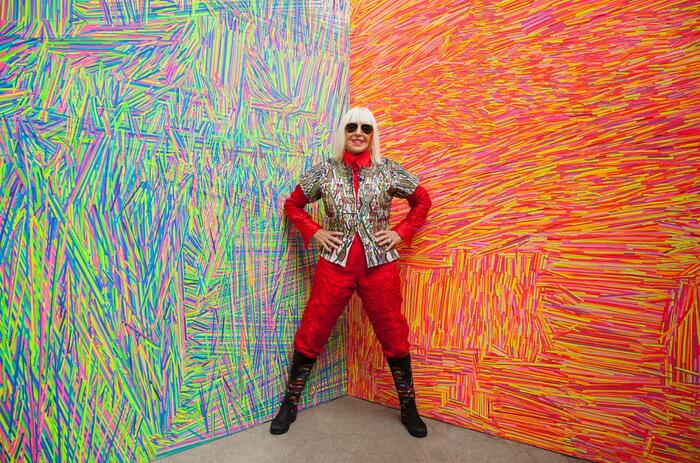
Intensity Life is Marta Minujín’s first retrospective exhibition in Europe, to be held at the Copenhagen Contemporary Museum.
MARTA MINUJIN’S FIRST RETROSPECTIVE EXHIBITION IN EUROPE
Intensity Life is Marta Minujín’s first retrospective exhibition in Europe, to be held at the Copenhagen Contemporary Museum.

The two venues of MEMORIA gallery enter into a necessary dialogue by hosting the individual but connected exhibitions of Gustavo Pérez (Mexico City, Mexico, 1950) and Lin Calle (Hubei, China, 1994), who put on the table, from their techniques and perspectives, a debate of thought on the impoverishment and extinction of contemporary imaginaries.
GUSTAVO PÉREZ AND LIN CALLE CONNECT IN THE ARBOREAL, IN MEMORIAM
The two venues of MEMORIA gallery enter into a necessary dialogue by hosting the individual but connected exhibitions of Gustavo Pérez (Mexico City, Mexico, 1950) and Lin Calle (Hubei, China, 1994), who put on the table, from their techniques and perspectives, a debate of thought on the impoverishment and extinction of contemporary imaginaries.
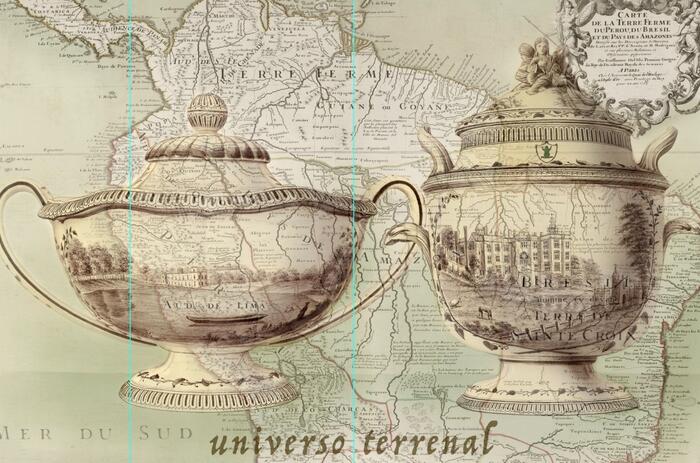
From her different interdisciplinary perspectives, Cecilia Paredes (Lima, Peru, 1950) lands in Blanca Berlin with a collection of images that deal with imaginary cartographies, displacements and human relations in their conceptual part, materialized, above all, on canvas as the main exhibition material. In Historias errantes (Wandering Stories), the Peruvian artist bets on recovering graphic materials anchored in antiquity, such as astrological charts, engravings of discoveries and maps, which become, after the manipulation of the parts, absolute compositions of impossible -but also aesthetic- iconography.
THE WANDERING STORIES OF CECILIA PAREDES, IN BLANCA BERLIN
From her different interdisciplinary perspectives, Cecilia Paredes (Lima, Peru, 1950) lands in Blanca Berlin with a collection of images that deal with imaginary cartographies, displacements and human relations in their conceptual part, materialized, above all, on canvas as the main exhibition material. In Historias errantes (Wandering Stories), the Peruvian artist bets on recovering graphic materials anchored in antiquity, such as astrological charts, engravings of discoveries and maps, which become, after the manipulation of the parts, absolute compositions of impossible -but also aesthetic- iconography.
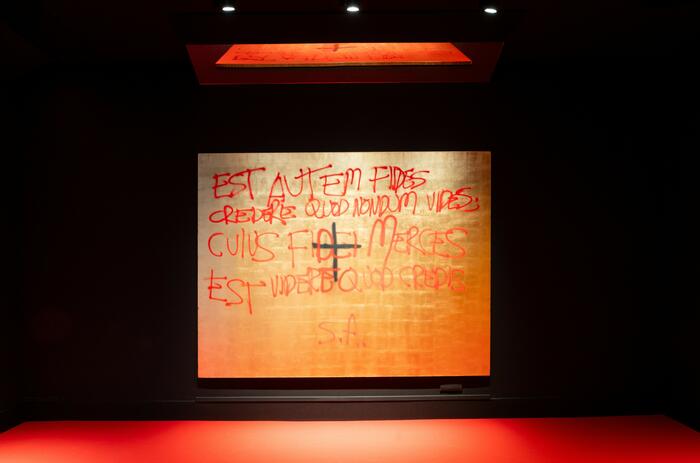
Stefan Brüggemann (Mexico City, Mexico, 1975) disembarks at Casa de México with Dos líneas (fe), a series that is understood as an installation and that starts from the impact and the apparent simplicity exposed to develop the concept of inheritance and its satellites. The Mexican conceptual artist uses the power reflected by symbols, religion and history, an element that he deploys, sometimes explicitly, in his large-format works.
STEFAN BRÜGGEMANN'S LINES OF FAITH, AT CASA DE MEXICO
Stefan Brüggemann (Mexico City, Mexico, 1975) disembarks at Casa de México with Dos líneas (fe), a series that is understood as an installation and that starts from the impact and the apparent simplicity exposed to develop the concept of inheritance and its satellites. The Mexican conceptual artist uses the power reflected by symbols, religion and history, an element that he deploys, sometimes explicitly, in his large-format works.
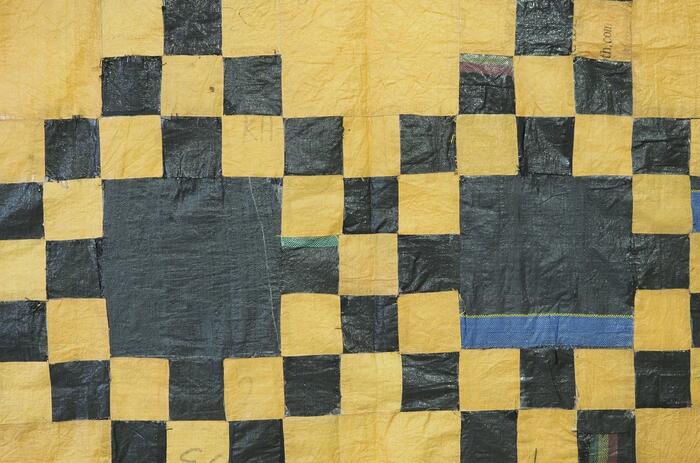
Casa de América is hosting three interconnected exhibitions in Madrid until November 30 that investigate and show the influence of the arts and the roots of pre-Columbian cultures in contemporary art and architecture.
THE PRE-COLUMBIAN ROOTS IN THE CONTEMPORARY, AT CASA DE AMERICA
Casa de América is hosting three interconnected exhibitions in Madrid until November 30 that investigate and show the influence of the arts and the roots of pre-Columbian cultures in contemporary art and architecture.
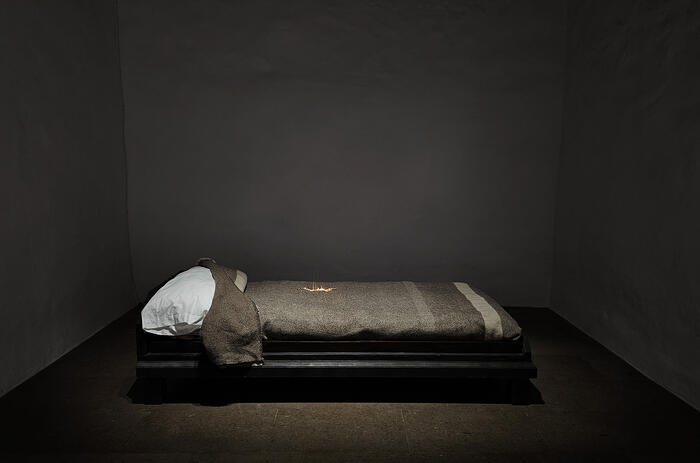
Pamen Pereira (Ferrol, Spain, 1963) unfolds her project Don't give up at Artizar gallery in Tenerife, a show made up of fourteen pieces that make up a total, but that must be seen from the prism of combination and language. However, the artist advocates for observing what is hidden behind the relationship of her works, the selection and the dialogue that the tour offers us.
PAMEN PEREIRA: SPACE, ORDER AND ELEMENTS, AT ARTIZAR
Pamen Pereira (Ferrol, Spain, 1963) unfolds her project Don't give up at Artizar gallery in Tenerife, a show made up of fourteen pieces that make up a total, but that must be seen from the prism of combination and language. However, the artist advocates for observing what is hidden behind the relationship of her works, the selection and the dialogue that the tour offers us.

Germán Tagle (Santiago, Chile, 1976) returns to Madrid's Daniel Cuevas, where he held his first exhibition two years ago, with El territorio portátil, a show in which the Chilean artist returns to the axes of landscape, painting and culture that have been the backbone of his latest productions.
GERMÁN TAGLE'S REDEFINITION OF LANDSCAPE
Germán Tagle (Santiago, Chile, 1976) returns to Madrid's Daniel Cuevas, where he held his first exhibition two years ago, with El territorio portátil, a show in which the Chilean artist returns to the axes of landscape, painting and culture that have been the backbone of his latest productions.

The double problem that arose from the acquisition in the 1980s of several hippopotamuses in one of the many eccentricities of the trafficker Pablo Escóbar is the starting point of a fable that, between the tragic and the comic, Camilo Restrepo (Medellín, Colombia, 1975) has managed to weave with a very successful graphic and conceptual narrative. With Cocaine Hippos Sweat Blood, the spectator faces this surrealistic story from its beginnings to the present by the hand of a figurativism that sets aside the academic and the technical for the sake of a greater aesthetic and relational concordance with that of the madness transmitted by the story itself.
THE NARCO-HYPOPOTAMUSES’ TALE, BY CAMILO RESTREPO
The double problem that arose from the acquisition in the 1980s of several hippopotamuses in one of the many eccentricities of the trafficker Pablo Escóbar is the starting point of a fable that, between the tragic and the comic, Camilo Restrepo (Medellín, Colombia, 1975) has managed to weave with a very successful graphic and conceptual narrative. With Cocaine Hippos Sweat Blood, the spectator faces this surrealistic story from its beginnings to the present by the hand of a figurativism that sets aside the academic and the technical for the sake of a greater aesthetic and relational concordance with that of the madness transmitted by the story itself.

Madrid's Elba Benitez gallery has entrusted Vik Muniz (Sao Paulo, Brazil, 1961) with its first exhibition of the new season. Entitled Photocubism, the proposal is based on art historiography itself, recovering the cubist aesthetics as a substratum of the technical intervention he makes on iconic works of this movement. The Brazilian artist thus opts for this language to obtain new images that raise questions about perception and result.

Liliana Porter (Buenos Aires, Argentina, 1941) has a long history shared with Espacio Minimo. The Madrid gallery pampers every move and celebrates the extensive relationship with the Argentinean artist, always offering her the possibility of receiving her work and witnessing its evolution. For the opening of the space's season, the landing is called Otros cuentos inconclusos, a new proposal that deals with representation and two dimensional axes —space and time— that bear witness to many of the questions raised about human relations.
THE UNFINISHED STORIES OF LILIANA PORTER
Liliana Porter (Buenos Aires, Argentina, 1941) has a long history shared with Espacio Minimo. The Madrid gallery pampers every move and celebrates the extensive relationship with the Argentinean artist, always offering her the possibility of receiving her work and witnessing its evolution. For the opening of the space's season, the landing is called Otros cuentos inconclusos, a new proposal that deals with representation and two dimensional axes —space and time— that bear witness to many of the questions raised about human relations.

Cuban-born artist Ariamna Contino presents the exhibition Manigua at El Apartamento, in Spain to revisit the concept of “manigua”, a term historically used to refer to a tropical forest ecosystem.
ARIAMNA CONTINO: THE FOREST IS DISORDER, ABUNDANCE AND CONFUSION

The artistic collective from Rio de Janeiro OPAVIVARÁ! intervenes in the space of the Capilla de Afuera of the Centro Andaluz de Arte Contemporáneo in Seville with its Rede social, a sensorial and materialized symbology with which the Brazilians invite the spectator to place himself in a position to negotiate and cooperate with his fellow men and women. The intervention, consisting of the unfolding of fabric hammocks that acquire the rhythm and cadence that the visitor imprints with his movement and presence and that adds sounds of snoring, follows the group's premise of building spaces and devices that offer a collaborative experience.
OPAVIVARÁ! INSTALLS ITS “SOCIAL NETWORK” IN THE CAAC
The artistic collective from Rio de Janeiro OPAVIVARÁ! intervenes in the space of the Capilla de Afuera of the Centro Andaluz de Arte Contemporáneo in Seville with its Rede social, a sensorial and materialized symbology with which the Brazilians invite the spectator to place himself in a position to negotiate and cooperate with his fellow men and women. The intervention, consisting of the unfolding of fabric hammocks that acquire the rhythm and cadence that the visitor imprints with his movement and presence and that adds sounds of snoring, follows the group's premise of building spaces and devices that offer a collaborative experience.

Intensity Life is Marta Minujín’s first retrospective exhibition in Europe, to be held at the Copenhagen Contemporary Museum.
MARTA MINUJIN’S FIRST RETROSPECTIVE EXHIBITION IN EUROPE
Intensity Life is Marta Minujín’s first retrospective exhibition in Europe, to be held at the Copenhagen Contemporary Museum.

The two venues of MEMORIA gallery enter into a necessary dialogue by hosting the individual but connected exhibitions of Gustavo Pérez (Mexico City, Mexico, 1950) and Lin Calle (Hubei, China, 1994), who put on the table, from their techniques and perspectives, a debate of thought on the impoverishment and extinction of contemporary imaginaries.
GUSTAVO PÉREZ AND LIN CALLE CONNECT IN THE ARBOREAL, IN MEMORIAM
The two venues of MEMORIA gallery enter into a necessary dialogue by hosting the individual but connected exhibitions of Gustavo Pérez (Mexico City, Mexico, 1950) and Lin Calle (Hubei, China, 1994), who put on the table, from their techniques and perspectives, a debate of thought on the impoverishment and extinction of contemporary imaginaries.

From her different interdisciplinary perspectives, Cecilia Paredes (Lima, Peru, 1950) lands in Blanca Berlin with a collection of images that deal with imaginary cartographies, displacements and human relations in their conceptual part, materialized, above all, on canvas as the main exhibition material. In Historias errantes (Wandering Stories), the Peruvian artist bets on recovering graphic materials anchored in antiquity, such as astrological charts, engravings of discoveries and maps, which become, after the manipulation of the parts, absolute compositions of impossible -but also aesthetic- iconography.
THE WANDERING STORIES OF CECILIA PAREDES, IN BLANCA BERLIN
From her different interdisciplinary perspectives, Cecilia Paredes (Lima, Peru, 1950) lands in Blanca Berlin with a collection of images that deal with imaginary cartographies, displacements and human relations in their conceptual part, materialized, above all, on canvas as the main exhibition material. In Historias errantes (Wandering Stories), the Peruvian artist bets on recovering graphic materials anchored in antiquity, such as astrological charts, engravings of discoveries and maps, which become, after the manipulation of the parts, absolute compositions of impossible -but also aesthetic- iconography.

Stefan Brüggemann (Mexico City, Mexico, 1975) disembarks at Casa de México with Dos líneas (fe), a series that is understood as an installation and that starts from the impact and the apparent simplicity exposed to develop the concept of inheritance and its satellites. The Mexican conceptual artist uses the power reflected by symbols, religion and history, an element that he deploys, sometimes explicitly, in his large-format works.
STEFAN BRÜGGEMANN'S LINES OF FAITH, AT CASA DE MEXICO
Stefan Brüggemann (Mexico City, Mexico, 1975) disembarks at Casa de México with Dos líneas (fe), a series that is understood as an installation and that starts from the impact and the apparent simplicity exposed to develop the concept of inheritance and its satellites. The Mexican conceptual artist uses the power reflected by symbols, religion and history, an element that he deploys, sometimes explicitly, in his large-format works.

Casa de América is hosting three interconnected exhibitions in Madrid until November 30 that investigate and show the influence of the arts and the roots of pre-Columbian cultures in contemporary art and architecture.
THE PRE-COLUMBIAN ROOTS IN THE CONTEMPORARY, AT CASA DE AMERICA
Casa de América is hosting three interconnected exhibitions in Madrid until November 30 that investigate and show the influence of the arts and the roots of pre-Columbian cultures in contemporary art and architecture.

Pamen Pereira (Ferrol, Spain, 1963) unfolds her project Don't give up at Artizar gallery in Tenerife, a show made up of fourteen pieces that make up a total, but that must be seen from the prism of combination and language. However, the artist advocates for observing what is hidden behind the relationship of her works, the selection and the dialogue that the tour offers us.
PAMEN PEREIRA: SPACE, ORDER AND ELEMENTS, AT ARTIZAR
Pamen Pereira (Ferrol, Spain, 1963) unfolds her project Don't give up at Artizar gallery in Tenerife, a show made up of fourteen pieces that make up a total, but that must be seen from the prism of combination and language. However, the artist advocates for observing what is hidden behind the relationship of her works, the selection and the dialogue that the tour offers us.

Germán Tagle (Santiago, Chile, 1976) returns to Madrid's Daniel Cuevas, where he held his first exhibition two years ago, with El territorio portátil, a show in which the Chilean artist returns to the axes of landscape, painting and culture that have been the backbone of his latest productions.
GERMÁN TAGLE'S REDEFINITION OF LANDSCAPE
Germán Tagle (Santiago, Chile, 1976) returns to Madrid's Daniel Cuevas, where he held his first exhibition two years ago, with El territorio portátil, a show in which the Chilean artist returns to the axes of landscape, painting and culture that have been the backbone of his latest productions.

The double problem that arose from the acquisition in the 1980s of several hippopotamuses in one of the many eccentricities of the trafficker Pablo Escóbar is the starting point of a fable that, between the tragic and the comic, Camilo Restrepo (Medellín, Colombia, 1975) has managed to weave with a very successful graphic and conceptual narrative. With Cocaine Hippos Sweat Blood, the spectator faces this surrealistic story from its beginnings to the present by the hand of a figurativism that sets aside the academic and the technical for the sake of a greater aesthetic and relational concordance with that of the madness transmitted by the story itself.
THE NARCO-HYPOPOTAMUSES’ TALE, BY CAMILO RESTREPO
The double problem that arose from the acquisition in the 1980s of several hippopotamuses in one of the many eccentricities of the trafficker Pablo Escóbar is the starting point of a fable that, between the tragic and the comic, Camilo Restrepo (Medellín, Colombia, 1975) has managed to weave with a very successful graphic and conceptual narrative. With Cocaine Hippos Sweat Blood, the spectator faces this surrealistic story from its beginnings to the present by the hand of a figurativism that sets aside the academic and the technical for the sake of a greater aesthetic and relational concordance with that of the madness transmitted by the story itself.

Madrid's Elba Benitez gallery has entrusted Vik Muniz (Sao Paulo, Brazil, 1961) with its first exhibition of the new season. Entitled Photocubism, the proposal is based on art historiography itself, recovering the cubist aesthetics as a substratum of the technical intervention he makes on iconic works of this movement. The Brazilian artist thus opts for this language to obtain new images that raise questions about perception and result.

Liliana Porter (Buenos Aires, Argentina, 1941) has a long history shared with Espacio Minimo. The Madrid gallery pampers every move and celebrates the extensive relationship with the Argentinean artist, always offering her the possibility of receiving her work and witnessing its evolution. For the opening of the space's season, the landing is called Otros cuentos inconclusos, a new proposal that deals with representation and two dimensional axes —space and time— that bear witness to many of the questions raised about human relations.
THE UNFINISHED STORIES OF LILIANA PORTER
Liliana Porter (Buenos Aires, Argentina, 1941) has a long history shared with Espacio Minimo. The Madrid gallery pampers every move and celebrates the extensive relationship with the Argentinean artist, always offering her the possibility of receiving her work and witnessing its evolution. For the opening of the space's season, the landing is called Otros cuentos inconclusos, a new proposal that deals with representation and two dimensional axes —space and time— that bear witness to many of the questions raised about human relations.

Cuban-born artist Ariamna Contino presents the exhibition Manigua at El Apartamento, in Spain to revisit the concept of “manigua”, a term historically used to refer to a tropical forest ecosystem.
ARIAMNA CONTINO: THE FOREST IS DISORDER, ABUNDANCE AND CONFUSION

The artistic collective from Rio de Janeiro OPAVIVARÁ! intervenes in the space of the Capilla de Afuera of the Centro Andaluz de Arte Contemporáneo in Seville with its Rede social, a sensorial and materialized symbology with which the Brazilians invite the spectator to place himself in a position to negotiate and cooperate with his fellow men and women. The intervention, consisting of the unfolding of fabric hammocks that acquire the rhythm and cadence that the visitor imprints with his movement and presence and that adds sounds of snoring, follows the group's premise of building spaces and devices that offer a collaborative experience.
OPAVIVARÁ! INSTALLS ITS “SOCIAL NETWORK” IN THE CAAC
The artistic collective from Rio de Janeiro OPAVIVARÁ! intervenes in the space of the Capilla de Afuera of the Centro Andaluz de Arte Contemporáneo in Seville with its Rede social, a sensorial and materialized symbology with which the Brazilians invite the spectator to place himself in a position to negotiate and cooperate with his fellow men and women. The intervention, consisting of the unfolding of fabric hammocks that acquire the rhythm and cadence that the visitor imprints with his movement and presence and that adds sounds of snoring, follows the group's premise of building spaces and devices that offer a collaborative experience.

Intensity Life is Marta Minujín’s first retrospective exhibition in Europe, to be held at the Copenhagen Contemporary Museum.
MARTA MINUJIN’S FIRST RETROSPECTIVE EXHIBITION IN EUROPE
Intensity Life is Marta Minujín’s first retrospective exhibition in Europe, to be held at the Copenhagen Contemporary Museum.

The two venues of MEMORIA gallery enter into a necessary dialogue by hosting the individual but connected exhibitions of Gustavo Pérez (Mexico City, Mexico, 1950) and Lin Calle (Hubei, China, 1994), who put on the table, from their techniques and perspectives, a debate of thought on the impoverishment and extinction of contemporary imaginaries.
GUSTAVO PÉREZ AND LIN CALLE CONNECT IN THE ARBOREAL, IN MEMORIAM
The two venues of MEMORIA gallery enter into a necessary dialogue by hosting the individual but connected exhibitions of Gustavo Pérez (Mexico City, Mexico, 1950) and Lin Calle (Hubei, China, 1994), who put on the table, from their techniques and perspectives, a debate of thought on the impoverishment and extinction of contemporary imaginaries.

From her different interdisciplinary perspectives, Cecilia Paredes (Lima, Peru, 1950) lands in Blanca Berlin with a collection of images that deal with imaginary cartographies, displacements and human relations in their conceptual part, materialized, above all, on canvas as the main exhibition material. In Historias errantes (Wandering Stories), the Peruvian artist bets on recovering graphic materials anchored in antiquity, such as astrological charts, engravings of discoveries and maps, which become, after the manipulation of the parts, absolute compositions of impossible -but also aesthetic- iconography.
THE WANDERING STORIES OF CECILIA PAREDES, IN BLANCA BERLIN
From her different interdisciplinary perspectives, Cecilia Paredes (Lima, Peru, 1950) lands in Blanca Berlin with a collection of images that deal with imaginary cartographies, displacements and human relations in their conceptual part, materialized, above all, on canvas as the main exhibition material. In Historias errantes (Wandering Stories), the Peruvian artist bets on recovering graphic materials anchored in antiquity, such as astrological charts, engravings of discoveries and maps, which become, after the manipulation of the parts, absolute compositions of impossible -but also aesthetic- iconography.

Stefan Brüggemann (Mexico City, Mexico, 1975) disembarks at Casa de México with Dos líneas (fe), a series that is understood as an installation and that starts from the impact and the apparent simplicity exposed to develop the concept of inheritance and its satellites. The Mexican conceptual artist uses the power reflected by symbols, religion and history, an element that he deploys, sometimes explicitly, in his large-format works.
STEFAN BRÜGGEMANN'S LINES OF FAITH, AT CASA DE MEXICO
Stefan Brüggemann (Mexico City, Mexico, 1975) disembarks at Casa de México with Dos líneas (fe), a series that is understood as an installation and that starts from the impact and the apparent simplicity exposed to develop the concept of inheritance and its satellites. The Mexican conceptual artist uses the power reflected by symbols, religion and history, an element that he deploys, sometimes explicitly, in his large-format works.

Casa de América is hosting three interconnected exhibitions in Madrid until November 30 that investigate and show the influence of the arts and the roots of pre-Columbian cultures in contemporary art and architecture.
THE PRE-COLUMBIAN ROOTS IN THE CONTEMPORARY, AT CASA DE AMERICA
Casa de América is hosting three interconnected exhibitions in Madrid until November 30 that investigate and show the influence of the arts and the roots of pre-Columbian cultures in contemporary art and architecture.

Pamen Pereira (Ferrol, Spain, 1963) unfolds her project Don't give up at Artizar gallery in Tenerife, a show made up of fourteen pieces that make up a total, but that must be seen from the prism of combination and language. However, the artist advocates for observing what is hidden behind the relationship of her works, the selection and the dialogue that the tour offers us.
PAMEN PEREIRA: SPACE, ORDER AND ELEMENTS, AT ARTIZAR
Pamen Pereira (Ferrol, Spain, 1963) unfolds her project Don't give up at Artizar gallery in Tenerife, a show made up of fourteen pieces that make up a total, but that must be seen from the prism of combination and language. However, the artist advocates for observing what is hidden behind the relationship of her works, the selection and the dialogue that the tour offers us.

Germán Tagle (Santiago, Chile, 1976) returns to Madrid's Daniel Cuevas, where he held his first exhibition two years ago, with El territorio portátil, a show in which the Chilean artist returns to the axes of landscape, painting and culture that have been the backbone of his latest productions.
GERMÁN TAGLE'S REDEFINITION OF LANDSCAPE
Germán Tagle (Santiago, Chile, 1976) returns to Madrid's Daniel Cuevas, where he held his first exhibition two years ago, with El territorio portátil, a show in which the Chilean artist returns to the axes of landscape, painting and culture that have been the backbone of his latest productions.

The double problem that arose from the acquisition in the 1980s of several hippopotamuses in one of the many eccentricities of the trafficker Pablo Escóbar is the starting point of a fable that, between the tragic and the comic, Camilo Restrepo (Medellín, Colombia, 1975) has managed to weave with a very successful graphic and conceptual narrative. With Cocaine Hippos Sweat Blood, the spectator faces this surrealistic story from its beginnings to the present by the hand of a figurativism that sets aside the academic and the technical for the sake of a greater aesthetic and relational concordance with that of the madness transmitted by the story itself.
THE NARCO-HYPOPOTAMUSES’ TALE, BY CAMILO RESTREPO
The double problem that arose from the acquisition in the 1980s of several hippopotamuses in one of the many eccentricities of the trafficker Pablo Escóbar is the starting point of a fable that, between the tragic and the comic, Camilo Restrepo (Medellín, Colombia, 1975) has managed to weave with a very successful graphic and conceptual narrative. With Cocaine Hippos Sweat Blood, the spectator faces this surrealistic story from its beginnings to the present by the hand of a figurativism that sets aside the academic and the technical for the sake of a greater aesthetic and relational concordance with that of the madness transmitted by the story itself.

Madrid's Elba Benitez gallery has entrusted Vik Muniz (Sao Paulo, Brazil, 1961) with its first exhibition of the new season. Entitled Photocubism, the proposal is based on art historiography itself, recovering the cubist aesthetics as a substratum of the technical intervention he makes on iconic works of this movement. The Brazilian artist thus opts for this language to obtain new images that raise questions about perception and result.

Liliana Porter (Buenos Aires, Argentina, 1941) has a long history shared with Espacio Minimo. The Madrid gallery pampers every move and celebrates the extensive relationship with the Argentinean artist, always offering her the possibility of receiving her work and witnessing its evolution. For the opening of the space's season, the landing is called Otros cuentos inconclusos, a new proposal that deals with representation and two dimensional axes —space and time— that bear witness to many of the questions raised about human relations.
THE UNFINISHED STORIES OF LILIANA PORTER
Liliana Porter (Buenos Aires, Argentina, 1941) has a long history shared with Espacio Minimo. The Madrid gallery pampers every move and celebrates the extensive relationship with the Argentinean artist, always offering her the possibility of receiving her work and witnessing its evolution. For the opening of the space's season, the landing is called Otros cuentos inconclusos, a new proposal that deals with representation and two dimensional axes —space and time— that bear witness to many of the questions raised about human relations.

Cuban-born artist Ariamna Contino presents the exhibition Manigua at El Apartamento, in Spain to revisit the concept of “manigua”, a term historically used to refer to a tropical forest ecosystem.
ARIAMNA CONTINO: THE FOREST IS DISORDER, ABUNDANCE AND CONFUSION

The artistic collective from Rio de Janeiro OPAVIVARÁ! intervenes in the space of the Capilla de Afuera of the Centro Andaluz de Arte Contemporáneo in Seville with its Rede social, a sensorial and materialized symbology with which the Brazilians invite the spectator to place himself in a position to negotiate and cooperate with his fellow men and women. The intervention, consisting of the unfolding of fabric hammocks that acquire the rhythm and cadence that the visitor imprints with his movement and presence and that adds sounds of snoring, follows the group's premise of building spaces and devices that offer a collaborative experience.
OPAVIVARÁ! INSTALLS ITS “SOCIAL NETWORK” IN THE CAAC
The artistic collective from Rio de Janeiro OPAVIVARÁ! intervenes in the space of the Capilla de Afuera of the Centro Andaluz de Arte Contemporáneo in Seville with its Rede social, a sensorial and materialized symbology with which the Brazilians invite the spectator to place himself in a position to negotiate and cooperate with his fellow men and women. The intervention, consisting of the unfolding of fabric hammocks that acquire the rhythm and cadence that the visitor imprints with his movement and presence and that adds sounds of snoring, follows the group's premise of building spaces and devices that offer a collaborative experience.

Intensity Life is Marta Minujín’s first retrospective exhibition in Europe, to be held at the Copenhagen Contemporary Museum.
MARTA MINUJIN’S FIRST RETROSPECTIVE EXHIBITION IN EUROPE
Intensity Life is Marta Minujín’s first retrospective exhibition in Europe, to be held at the Copenhagen Contemporary Museum.

The two venues of MEMORIA gallery enter into a necessary dialogue by hosting the individual but connected exhibitions of Gustavo Pérez (Mexico City, Mexico, 1950) and Lin Calle (Hubei, China, 1994), who put on the table, from their techniques and perspectives, a debate of thought on the impoverishment and extinction of contemporary imaginaries.
GUSTAVO PÉREZ AND LIN CALLE CONNECT IN THE ARBOREAL, IN MEMORIAM
The two venues of MEMORIA gallery enter into a necessary dialogue by hosting the individual but connected exhibitions of Gustavo Pérez (Mexico City, Mexico, 1950) and Lin Calle (Hubei, China, 1994), who put on the table, from their techniques and perspectives, a debate of thought on the impoverishment and extinction of contemporary imaginaries.

From her different interdisciplinary perspectives, Cecilia Paredes (Lima, Peru, 1950) lands in Blanca Berlin with a collection of images that deal with imaginary cartographies, displacements and human relations in their conceptual part, materialized, above all, on canvas as the main exhibition material. In Historias errantes (Wandering Stories), the Peruvian artist bets on recovering graphic materials anchored in antiquity, such as astrological charts, engravings of discoveries and maps, which become, after the manipulation of the parts, absolute compositions of impossible -but also aesthetic- iconography.
THE WANDERING STORIES OF CECILIA PAREDES, IN BLANCA BERLIN
From her different interdisciplinary perspectives, Cecilia Paredes (Lima, Peru, 1950) lands in Blanca Berlin with a collection of images that deal with imaginary cartographies, displacements and human relations in their conceptual part, materialized, above all, on canvas as the main exhibition material. In Historias errantes (Wandering Stories), the Peruvian artist bets on recovering graphic materials anchored in antiquity, such as astrological charts, engravings of discoveries and maps, which become, after the manipulation of the parts, absolute compositions of impossible -but also aesthetic- iconography.

Stefan Brüggemann (Mexico City, Mexico, 1975) disembarks at Casa de México with Dos líneas (fe), a series that is understood as an installation and that starts from the impact and the apparent simplicity exposed to develop the concept of inheritance and its satellites. The Mexican conceptual artist uses the power reflected by symbols, religion and history, an element that he deploys, sometimes explicitly, in his large-format works.
STEFAN BRÜGGEMANN'S LINES OF FAITH, AT CASA DE MEXICO
Stefan Brüggemann (Mexico City, Mexico, 1975) disembarks at Casa de México with Dos líneas (fe), a series that is understood as an installation and that starts from the impact and the apparent simplicity exposed to develop the concept of inheritance and its satellites. The Mexican conceptual artist uses the power reflected by symbols, religion and history, an element that he deploys, sometimes explicitly, in his large-format works.

Casa de América is hosting three interconnected exhibitions in Madrid until November 30 that investigate and show the influence of the arts and the roots of pre-Columbian cultures in contemporary art and architecture.
THE PRE-COLUMBIAN ROOTS IN THE CONTEMPORARY, AT CASA DE AMERICA
Casa de América is hosting three interconnected exhibitions in Madrid until November 30 that investigate and show the influence of the arts and the roots of pre-Columbian cultures in contemporary art and architecture.

Pamen Pereira (Ferrol, Spain, 1963) unfolds her project Don't give up at Artizar gallery in Tenerife, a show made up of fourteen pieces that make up a total, but that must be seen from the prism of combination and language. However, the artist advocates for observing what is hidden behind the relationship of her works, the selection and the dialogue that the tour offers us.
PAMEN PEREIRA: SPACE, ORDER AND ELEMENTS, AT ARTIZAR
Pamen Pereira (Ferrol, Spain, 1963) unfolds her project Don't give up at Artizar gallery in Tenerife, a show made up of fourteen pieces that make up a total, but that must be seen from the prism of combination and language. However, the artist advocates for observing what is hidden behind the relationship of her works, the selection and the dialogue that the tour offers us.

Germán Tagle (Santiago, Chile, 1976) returns to Madrid's Daniel Cuevas, where he held his first exhibition two years ago, with El territorio portátil, a show in which the Chilean artist returns to the axes of landscape, painting and culture that have been the backbone of his latest productions.
GERMÁN TAGLE'S REDEFINITION OF LANDSCAPE
Germán Tagle (Santiago, Chile, 1976) returns to Madrid's Daniel Cuevas, where he held his first exhibition two years ago, with El territorio portátil, a show in which the Chilean artist returns to the axes of landscape, painting and culture that have been the backbone of his latest productions.

The double problem that arose from the acquisition in the 1980s of several hippopotamuses in one of the many eccentricities of the trafficker Pablo Escóbar is the starting point of a fable that, between the tragic and the comic, Camilo Restrepo (Medellín, Colombia, 1975) has managed to weave with a very successful graphic and conceptual narrative. With Cocaine Hippos Sweat Blood, the spectator faces this surrealistic story from its beginnings to the present by the hand of a figurativism that sets aside the academic and the technical for the sake of a greater aesthetic and relational concordance with that of the madness transmitted by the story itself.
THE NARCO-HYPOPOTAMUSES’ TALE, BY CAMILO RESTREPO
The double problem that arose from the acquisition in the 1980s of several hippopotamuses in one of the many eccentricities of the trafficker Pablo Escóbar is the starting point of a fable that, between the tragic and the comic, Camilo Restrepo (Medellín, Colombia, 1975) has managed to weave with a very successful graphic and conceptual narrative. With Cocaine Hippos Sweat Blood, the spectator faces this surrealistic story from its beginnings to the present by the hand of a figurativism that sets aside the academic and the technical for the sake of a greater aesthetic and relational concordance with that of the madness transmitted by the story itself.

Madrid's Elba Benitez gallery has entrusted Vik Muniz (Sao Paulo, Brazil, 1961) with its first exhibition of the new season. Entitled Photocubism, the proposal is based on art historiography itself, recovering the cubist aesthetics as a substratum of the technical intervention he makes on iconic works of this movement. The Brazilian artist thus opts for this language to obtain new images that raise questions about perception and result.

Liliana Porter (Buenos Aires, Argentina, 1941) has a long history shared with Espacio Minimo. The Madrid gallery pampers every move and celebrates the extensive relationship with the Argentinean artist, always offering her the possibility of receiving her work and witnessing its evolution. For the opening of the space's season, the landing is called Otros cuentos inconclusos, a new proposal that deals with representation and two dimensional axes —space and time— that bear witness to many of the questions raised about human relations.
THE UNFINISHED STORIES OF LILIANA PORTER
Liliana Porter (Buenos Aires, Argentina, 1941) has a long history shared with Espacio Minimo. The Madrid gallery pampers every move and celebrates the extensive relationship with the Argentinean artist, always offering her the possibility of receiving her work and witnessing its evolution. For the opening of the space's season, the landing is called Otros cuentos inconclusos, a new proposal that deals with representation and two dimensional axes —space and time— that bear witness to many of the questions raised about human relations.

Cuban-born artist Ariamna Contino presents the exhibition Manigua at El Apartamento, in Spain to revisit the concept of “manigua”, a term historically used to refer to a tropical forest ecosystem.
ARIAMNA CONTINO: THE FOREST IS DISORDER, ABUNDANCE AND CONFUSION

The artistic collective from Rio de Janeiro OPAVIVARÁ! intervenes in the space of the Capilla de Afuera of the Centro Andaluz de Arte Contemporáneo in Seville with its Rede social, a sensorial and materialized symbology with which the Brazilians invite the spectator to place himself in a position to negotiate and cooperate with his fellow men and women. The intervention, consisting of the unfolding of fabric hammocks that acquire the rhythm and cadence that the visitor imprints with his movement and presence and that adds sounds of snoring, follows the group's premise of building spaces and devices that offer a collaborative experience.
OPAVIVARÁ! INSTALLS ITS “SOCIAL NETWORK” IN THE CAAC
The artistic collective from Rio de Janeiro OPAVIVARÁ! intervenes in the space of the Capilla de Afuera of the Centro Andaluz de Arte Contemporáneo in Seville with its Rede social, a sensorial and materialized symbology with which the Brazilians invite the spectator to place himself in a position to negotiate and cooperate with his fellow men and women. The intervention, consisting of the unfolding of fabric hammocks that acquire the rhythm and cadence that the visitor imprints with his movement and presence and that adds sounds of snoring, follows the group's premise of building spaces and devices that offer a collaborative experience.

Intensity Life is Marta Minujín’s first retrospective exhibition in Europe, to be held at the Copenhagen Contemporary Museum.
MARTA MINUJIN’S FIRST RETROSPECTIVE EXHIBITION IN EUROPE
Intensity Life is Marta Minujín’s first retrospective exhibition in Europe, to be held at the Copenhagen Contemporary Museum.

The two venues of MEMORIA gallery enter into a necessary dialogue by hosting the individual but connected exhibitions of Gustavo Pérez (Mexico City, Mexico, 1950) and Lin Calle (Hubei, China, 1994), who put on the table, from their techniques and perspectives, a debate of thought on the impoverishment and extinction of contemporary imaginaries.
GUSTAVO PÉREZ AND LIN CALLE CONNECT IN THE ARBOREAL, IN MEMORIAM
The two venues of MEMORIA gallery enter into a necessary dialogue by hosting the individual but connected exhibitions of Gustavo Pérez (Mexico City, Mexico, 1950) and Lin Calle (Hubei, China, 1994), who put on the table, from their techniques and perspectives, a debate of thought on the impoverishment and extinction of contemporary imaginaries.

From her different interdisciplinary perspectives, Cecilia Paredes (Lima, Peru, 1950) lands in Blanca Berlin with a collection of images that deal with imaginary cartographies, displacements and human relations in their conceptual part, materialized, above all, on canvas as the main exhibition material. In Historias errantes (Wandering Stories), the Peruvian artist bets on recovering graphic materials anchored in antiquity, such as astrological charts, engravings of discoveries and maps, which become, after the manipulation of the parts, absolute compositions of impossible -but also aesthetic- iconography.
THE WANDERING STORIES OF CECILIA PAREDES, IN BLANCA BERLIN
From her different interdisciplinary perspectives, Cecilia Paredes (Lima, Peru, 1950) lands in Blanca Berlin with a collection of images that deal with imaginary cartographies, displacements and human relations in their conceptual part, materialized, above all, on canvas as the main exhibition material. In Historias errantes (Wandering Stories), the Peruvian artist bets on recovering graphic materials anchored in antiquity, such as astrological charts, engravings of discoveries and maps, which become, after the manipulation of the parts, absolute compositions of impossible -but also aesthetic- iconography.

Stefan Brüggemann (Mexico City, Mexico, 1975) disembarks at Casa de México with Dos líneas (fe), a series that is understood as an installation and that starts from the impact and the apparent simplicity exposed to develop the concept of inheritance and its satellites. The Mexican conceptual artist uses the power reflected by symbols, religion and history, an element that he deploys, sometimes explicitly, in his large-format works.
STEFAN BRÜGGEMANN'S LINES OF FAITH, AT CASA DE MEXICO
Stefan Brüggemann (Mexico City, Mexico, 1975) disembarks at Casa de México with Dos líneas (fe), a series that is understood as an installation and that starts from the impact and the apparent simplicity exposed to develop the concept of inheritance and its satellites. The Mexican conceptual artist uses the power reflected by symbols, religion and history, an element that he deploys, sometimes explicitly, in his large-format works.

Casa de América is hosting three interconnected exhibitions in Madrid until November 30 that investigate and show the influence of the arts and the roots of pre-Columbian cultures in contemporary art and architecture.
THE PRE-COLUMBIAN ROOTS IN THE CONTEMPORARY, AT CASA DE AMERICA
Casa de América is hosting three interconnected exhibitions in Madrid until November 30 that investigate and show the influence of the arts and the roots of pre-Columbian cultures in contemporary art and architecture.

Pamen Pereira (Ferrol, Spain, 1963) unfolds her project Don't give up at Artizar gallery in Tenerife, a show made up of fourteen pieces that make up a total, but that must be seen from the prism of combination and language. However, the artist advocates for observing what is hidden behind the relationship of her works, the selection and the dialogue that the tour offers us.
PAMEN PEREIRA: SPACE, ORDER AND ELEMENTS, AT ARTIZAR
Pamen Pereira (Ferrol, Spain, 1963) unfolds her project Don't give up at Artizar gallery in Tenerife, a show made up of fourteen pieces that make up a total, but that must be seen from the prism of combination and language. However, the artist advocates for observing what is hidden behind the relationship of her works, the selection and the dialogue that the tour offers us.

